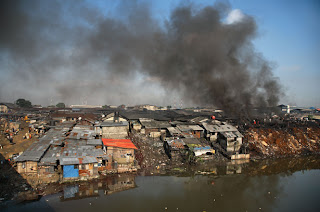Below is a paper proposal I submitted for my social movements class. I had a hard time writing this because I was so conflicted. I have never lived in the Niger Delta and I probably do not have the best understanding of the situation. I got feedback from friends and family. My cousin who works with Shell has a different opinion on the cause of "apathy" in the region. I'm also very conflicted on the use of "apathy". In the words of a friend, what looks like non-participation can be a form of resistance. I love having pictures in posts, and while searching for images, I stumbled on this post with multiple images of the Niger Delta on Nairaland.
Taylor and van Dyke define protests as
"sites of contestation in which bodies, symbols, identities, practices,
and discourses are used to pursue or prevent changes in institutionalized power
relations (2004: 268). The current conflict in the Niger Delta is as a result
of tensions between foreign oil corporations and ethnic groups in the region
over the adverse effects it has brought to the people in the region and the
implications on the environment. The Niger Delta crisis has led to the emergence
of numerous protest movements, such as the Movement for the Survival of Ogoni
People (MOSOP, Ijaw Council for Human Rights (ICHR), the Niger Delta Focus
(NDF), and the Women Initiatives Network (WINET). I argue that these protest
movements have failed to take off due to apathy among Nigerians.
Protests have been used as a tool to influence
decision making in the Niger Delta. Although some of these groups have
transitioned from protest groups to militant action, my paper will show that
these groups had a core protest agenda at their formation. I will touch on the
struggle of these movements to mobilize the media and powerful actors in the
Nigerian state as explained by Della Porta and Diani. The success of these
protest movements are important to the Niger Delta because of their ability to
influence state legislative policy making, which in turn can target the
practices of oil companies in the Niger Delta.
My paper will argue that Nigerians have become
apathetic to various Niger Delta movements due to the nature of class
relations, ethnicism, alienation of supporters by various movements and state
repression. My paper uses the term apathy based on the definition by Bignall
(2010, 8) as "socially indicated by a systemic loss of interest and attachment".
Ethnic identities are weapons for contesting political power and hence access
to oil wealth (Ojakorotu) in a plural society like Nigeria. An example is the
Ijaw-Itsekiri (dates) conflict which was oil-induced (Okolo). The violent
techniques some of these protest groups have engaged in have alienated
supporters. MEND, for example, uses tactics such as guerilla warfare,
kidnappings, and pipeline bombings. Della Porta & Diani state that the use
of violence has both symbolic and instrumental aims. Violence can be used as a
symbolic refusal of an oppressive system and can be used to win specific
battles, such as media attention. They also identify some limitation of the
logic of violence, such as the possibility of alienating sympathizers
(174). State repression techniques in the Niger Delta usually include
military action by the state-led Joint Task Force and the
"destruction of communities by state security forces abound: in Umuechem
1990 and 1993, in Uwheru in 2004 and Odioma in 2005" (Ojakorotu, 2009). This
raises important questions for human security especially in a region where
poverty, disease, famine, and unemployment is rife.
 |
| Image source |
Colonial rule had a divisive impact on
intergroup relations in Nigeria. The British artificially divided Nigeria into
Districts, Divisions and Provinces which pitted groups against each other
(Aghalino, 3). He further notes that "the history of the struggle for
autonomy and property rights dates back to the pre-colonial period" and so
has the politicization of the common wealth derived from the exploitation of
oil. I will analyze oil exploration in the Niger Delta using a trans capitalist
lens. In addition, how does the ideology of global capitalism help explain the
power struggles over oil profits (whose wealth is not shared by all) and what
roles does discrimination based on ethnicity and fascist policies play in these
struggles? Can trans capitalism help with resource control or common wealth?
My paper will also touch on the Marxian
approach to political economy and class struggles. Using the Marxian
perspective that the most important human concern is that of economic struggle,
I use this logic to argue the point that this drives apathy in the Niger Delta.
The Marxian view point that the only way man can act freely and express himself
and his potential is in a "classless society where the interest of all is
entrenched and enforced by the rule of the proletariats and power-free social
relations"(Omoyibo, 21) results in indifference. Niger Deltans are
indifferent to various protest movements happening in the region due to class
consciousness and their interactions with the bourgeoisie.




